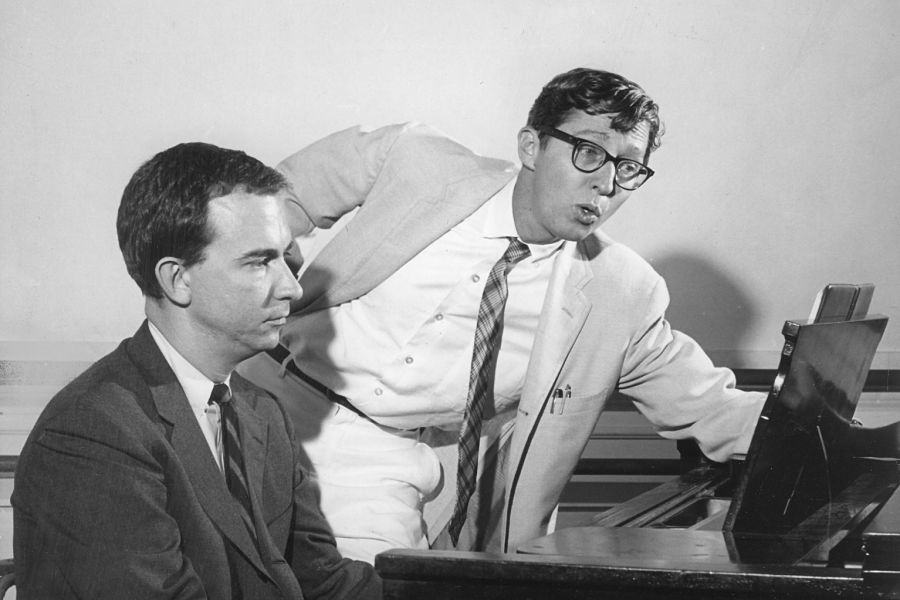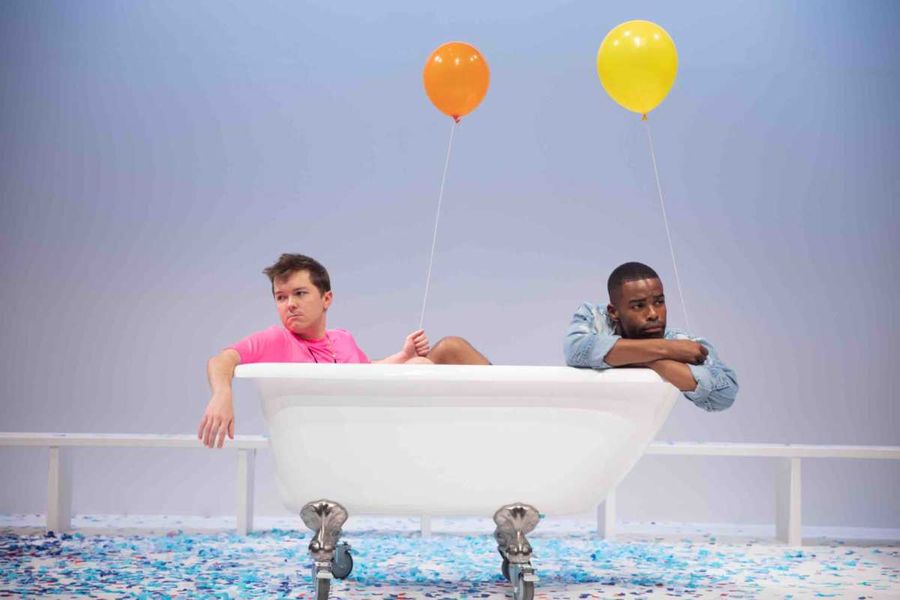On June 3, the word most often on the lips of people pouring out of Flint Repertory Theatre in Michigan was “stunning.” They had just witnessed the premiere of a new version of The Fantasticks, the 1960 musical charmer, newly rewritten by its original lyricist/librettist Tom Jones to tell the story of two young men falling in love rather than the original’s boy and girl.
“I have to say, the story works better this way,” said Paul Molnar, a Kansas theatre artist who traveled to see the show. “I think the story lands more effectively. Not to say it didn’t work before—it did. But things change. The world is very different now, and what a brave retelling.”
The project, which runs through June 19, is the brainchild of Flint Rep’s artistic director, Michael Lluberes, who said he fell in love with The Fantasticks in middle school. In college, he experimented with a few scenes to see how it might work with gay lovers. During the early days of the COVID-19 pandemic, he approached Tom Jones (the show’s composer, Harvey Schmidt, died in 2018) to ask for the rights to do the whole show that way.
“I wanted to see if the idea would fly, if he would be up for it,” Lluberes said. “He was intrigued.”
So intrigued, in fact, that he wanted to take the idea further than Lluberes had imagined. Lluberes said he had planned simply to change pronouns—make Luisa “Lewis” but otherwise leave the show pretty much the same—while Jones said he wanted to tinker a bit more with the 60-year-old show.
“He said, ‘Actually, I think this is a great idea—I’m going to do it,’” Lluberes recalled. “It astonished me. He basically went through it over a couple of months and did all this work on it—little detailed work on the lyrics and the scenes.”
Among the changes Jones made: He changed the gender of the parents who secretly conspire to keep their children apart, all the better to whet their appetites for each other, from fathers into mothers. Jones and Lluberes collaborated on other details up to a few weeks before opening, though they did so remotely. “It’s been all long-distance work, but it’s been a give-and-take creative experience,” Jones said. “The most fun is anticipating and not having a clue how it’s going to go over.”

Had he been able to attend opening night, he would have seen how well it went over with an enthusiastic and responsive audience. Theresa Beckley-Amaya, a Detroit resident, admitted that she had never seen The Fantasticks, but thought the new version worked “perfectly.”
Jane Smalley, who now lives in Flint, said she came to the show because she is a cousin of Harvey Schmidt, the show’s composer, whom she recalls as a great storyteller at family reunions. She was pleased that her favorite songs had not been cut.
“I would have never even known if I hadn’t read in the program that it wasn’t originally two guys,” Beckley-Amaya said. “I would have just thought it had been written like this.”
“I’ll admit I have a personal connection, but I thought it was well done,” Smalley said. “I always have more trouble connecting with the second act, and somehow this floated me along better. They’re lucky it got picked up and taken care of the way it did, with just the right people behind it.”
Lluberes’s team remained true to the show’s original bare-bones vision. As it was Off-Broadway, accompaniment for the new production is provided by a single pianist, in this case music director Brian E. Buckner. No one in the cast is miked. And Shane Cinal’s scenic design is a commanding all-white set with a single bench and porcelain bathtub on wheels, which became the backdrop for creative use of confetti as well as Chelsie McPhilimy’s dramatic lighting.
“It was phenomenal,” said Emily Stokes, another audience member having her first Fantasticks experience. “The set was breathtaking. It was so minimal and then it turned into this confetti cannon of emotion.”
Jones, who has followed some of the responses to the show even though he hasn’t been able to attend it, approves of this approach. “I’m hoping that others will pick it up,” he said, noting that the musical’s licensing agency, Music Theatre International, has already fielded several inquiries, “and instead of spending all their money on elaborate scenery, go back to the fundamentals of gathering together, of providing a theatre that’s close and intimate, that will make you laugh and make you cry and make you feel different once you’ve walked out than you did when you walked in.”
Mark Gmazel, who has performed in many shows at Flint Rep, praised the show’s deceptive simplicity. “It really opened up deeper currents and avenues of thought and exploration,” he said. “Just the use of that confetti! As the technical guy, I’m calculating how much confetti is in the blowers, but when you see it executed—it was simple and beautiful and it made a point.”

The point, said Brandon R. McWilliams—a longtime Lluberes collaborator who designed costumes with a four-color comic palette—is to reframe a heteronormative story for a new age. “It’s such a monumental piece of storytelling for gay people,” McWilliams said. “There’s something about reclaiming a story that has lived in the theatre canon for so many years. It’s meant ‘love’ in a certain way for so many people for so long, and there’s something really poignant about it when it’s about two people of the same sex.”
He mentioned an exchange with El Gallo, the show’s narrator, that Jones has added to the revised script. “Two boys. Two boys? And you’re not worried?” he asks the mothers when he learns of their plot. One brushes him off simply, saying, “They love each other. Why should we be worried?” To which El Gallo replies, “Good point. Very good point.”
McWilliams feels that this new take “connects to something a bit deeper, something more true to what the core of the story is about. You think, this is the gay Fantasticks, right? It is but it isn’t. Maybe that’s all Michael saw when he started this whole idea: that this story is relevant to us, not just heterosexuals, but everyone.”
Gmazel said he thinks this reimagining will give new life to a show.
“The new take on it, with the LGBTQ angle, makes the play sellable again,” Gmazel said the day after opening. “The play I saw last night, it had legs. It’s a show you could reasonably see Off-Broadway or on a tour. It’s the kind of show that repertory companies are going to want to do.”
Bridgette M. Redman (she/her) writes about theatre and the arts for publications around the country. Her work has recently appeared in Encore Monthly, OnStage blog, and the Chicago Reader. She’s been a theatre critic since 2005.


